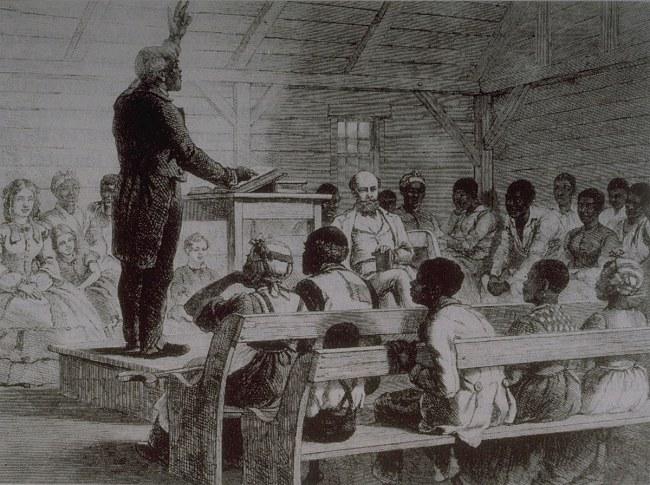Family Worship in Plantation in South Carolina
This engraving was published in the Illustrated London News in December 1863, illustrated by Frank Vizetelly. Depicted is the planation owner, his family, and slaves listening to an older slave preaching. The preaching slave could read, but not write. The chapel that the mass is being held in was built for the slaves of the plantation, hence the bareness. Also note the division between the master, his son, and wife and daughter. The master is closer to his slaves, his property. But, there is also space on the bench, which could imply separation between him and his slaves. His son is framed by the table and preaching slave, perhaps emphasizing his role as heir to the plantation. The slaves express ranging amounts of engagement; some are visibly tired, others are intent on the older slaves words. The preaching slave strikes a classical orator pose with his hand in the air with a couple figures sticking out. The wife and daughter are the perimeter of engraving, maybe hinting to her minor role in the plantation.
Below the "Family Worship" is an engraving titled "The War in America: The Federals Shelling the City of Charleston.--Shell Bursting in the Streets." Why do you think these two engravings were placed on the same page? Also, why would Great Britain be interested in the American South during the American Civil War? Who do you think read the Illustrated London News? Aristocracy? Middle class? Lower class?
Sandra J. Still and Emily Katt. "Slaves at Worship on Plantation in South Carolina". The Civil War in America from The Illustrated London News. Emory University: Collection Management, and the Beck Center. Accessed November 2, 2018. http://iln.digitalscholarship.emory.edu/browse/iln43.1234.007/
Sandra J. Still and Emily Katt. "Figure- Family Worship in a Plantation in Suth Carolina. -- See Page 574; The War in America: The Federals Shelling the City of Charleston.--Shell Bursting in the Streets. -- From a Sketch by Our Special Artist. -- See Page 574."The Civil War in America from The Illustrated London News. Emory University: Collection Management, and the Beck Center. Accessed November 2, 2018. http://iln.digitalscholarship.emory.edu/illustrationlarge/v43p561.jpg/
If you would like to see the whole December 5, 1863 newspaper issue go to (unfortunately you will not be able to see close ups of the articles):
https://www.britishnewspaperarchive.co.uk/search/results/1863-12-05?News...

Vizetelly, Frank (Illustrator). Mason Jackson (Engraver). "Family Worship in a Plantation in South Carolina". in Illustrated London News 43, December 5, 1836. The New York Public Library: Digital Collections: Print Collection. https://digitalcollections.nypl.org/items/b1dd3bd3-ae7e-dc5d-e040-e00a18... (Accessed November 2, 2018).
Public Domain
Public Domain is a copyright term that is often used when talking about copyright for creative works. Under U.S. copyright law, individual items that are in the public domain are items that are no longer protected by copyright law. This means that you do not need to request permission to re-use, re-publish or even change a copy of the item. Items enter the public domain under U.S. copyright law for a number of reasons: the original copyright may have expired; the item was created by the U.S. Federal Government or other governmental entity that views the things it creates as in the public domain; the work was never protected by copyright for some other reason related to how it was produced (for example, it was a speech that wasn't written down or recorded); or the work doesn't have enough originality to make it eligible for copyright protection.
Add a comment
PLEASE NOTE: NCpedia provides the comments feature as a way for viewers to engage with the resources. Comments are not published until reviewed by NCpedia editors at the State Library of NC, and the editors reserve the right to not publish any comment submitted that is considered inappropriate for this resource. NCpedia will not publish personal contact information in comments, questions, or responses. If you would like a reply by email, note that some email servers, such as public school accounts, are blocked from accepting messages from outside email servers or domains. If you prefer not to leave an email address, check back at your NCpedia comment for a reply. Please allow one business day for replies from NCpedia. Complete guidelines are available at https://ncpedia.org/about.